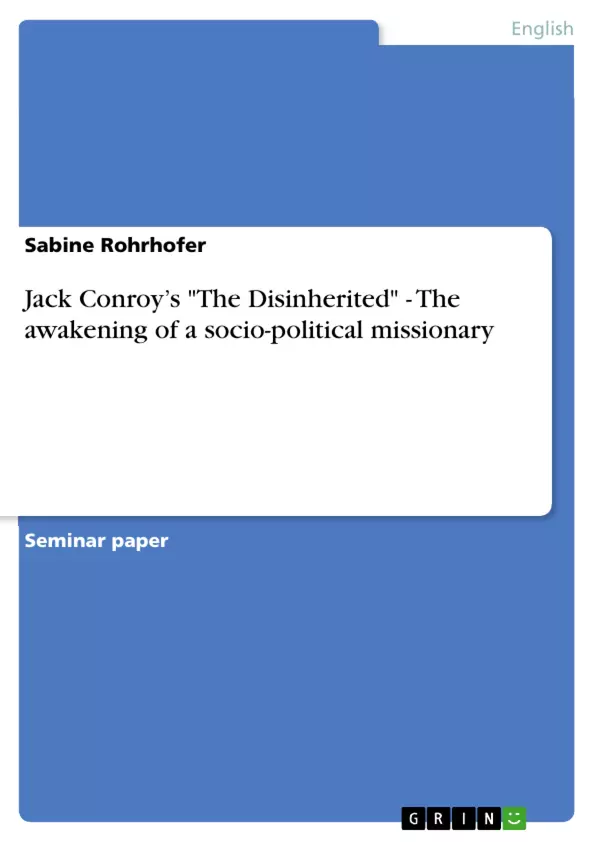There are many ways to read Jack Conroy’s The Disinherited. Ever since it was published the first time in 1933, critics and friends of the author differed in their receptions and assessments of the novel. To some contemporary critics, for instance Gold, Farrell and Hicks, The Disinherited conveyed too few communist ideas and did not satisfactorily “recommend militancy as a general solution for the workers’ problems.” The communist party indeed is not explicitly present in the novel; to Conroy, Marxist politics did not play a crucial role in proletarian literature. Yet on the whole, the left-wing critics praised the book. After its immediate success, the impact of the House of Un-American Activities Committee (HUAC) in the 1950s silenced the radical thinker Conroy, who had thenceforth difficulties in finding a publisher. Finally, since 1963, when “Daniel Aaron exhumed” the novel, Conroy’s literary writing has been gradually rediscovered and the author has been rehabilitated to some extent.
Since any attempts to discover the author’s original intentions remain inevitably vague and speculative, this paper will not try to find out the true interpretation of The Disinherited. I will rather focus on an alternative reading which is possible to the present-day reader, who deciphers the novel approximately 70 years after its first publication and in different socio-political circumstances. In Walsh’s opinion, the novel “never rises to the level of a work of art in which each element is subordinated to a single unifying purpose.” Yet, I claim that there is a priority aim: My suggestion is to interpret the narrator’s development as the awakening of a missionary who is not interested in a particular religion, but rather stands up for socio-political amendments in favour of the working class. In some respects, the reader may even draw parallels between Larry Donovan and Jesus Christ: both had a strong mother and a very “influential” father; both moved around a great deal, both sided with the underprivileged and tried to help them, and both were spokesmen of the lower-classes, for whose interests they eventually sacrificed themselves.
Inhaltsverzeichnis (Table of Contents)
- Introduction
- The Disinherited
- The Awakening of a Socio-political Missionary
- I. The Death of the Father
- II. The Railroad Strike
- III. The Concept of Education
- Conclusion
Zielsetzung und Themenschwerpunkte (Objectives and Key Themes)
This paper aims to offer an alternative reading of Jack Conroy's The Disinherited, focusing on the development of the narrator as a socio-political missionary. It argues that the novel goes beyond a simple depiction of working-class life and presents a story of social awareness and activism.
- The awakening of class consciousness
- The importance of education and language in shaping social perspectives
- The challenges of working-class life and the struggle for survival
- The role of the individual in promoting social change
- The authenticity of proletarian literature and its departure from traditional literary forms
Zusammenfassung der Kapitel (Chapter Summaries)
The novel is divided into three parts: Monkey Nest Camp, Bull Market, and The Hard Winter. Part I depicts the protagonist's childhood in a mining community, exploring his early experiences and the development of his social consciousness. The narrative structure mirrors the child's confusion and unawareness of time, presenting a fragmented but detailed picture of his early life. The death of the protagonist's father and the eviction from Monkey Nest Camp mark a turning point, pushing him towards a greater awareness of both time and the struggle for survival.
Part II follows the protagonist as he moves through various jobs and experiences, working in the railroad industry, the steel mill, the rubber heel plant, and ultimately the automobile industry in Chicago. The narrative emphasizes the dangerous and unhealthy conditions of these jobs, depicting the gradual deterioration of the quality of work and the increasing pressure on the workers. The chapter focuses on the protagonist's journey towards social and political awareness.
Schlüsselwörter (Keywords)
The main keywords and focus topics of the text include proletarian literature, class consciousness, social awareness, working-class life, education, language, social change, and the role of the individual in promoting social justice.
- Quote paper
- Sabine Rohrhofer (Author), 2002, Jack Conroy’s "The Disinherited" - The awakening of a socio-political missionary, Munich, GRIN Verlag, https://www.grin.com/document/4763



